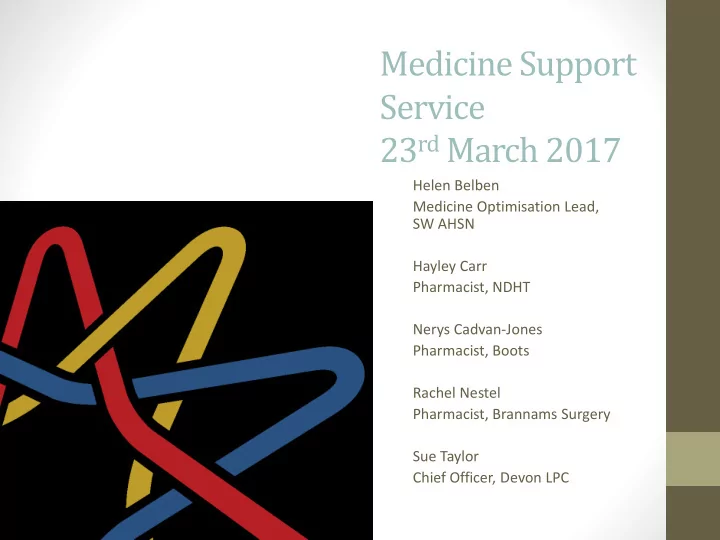

Medicine Support Service 23 rd March 2017 Helen Belben Medicine Optimisation Lead, SW AHSN Hayley Carr Pharmacist, NDHT Nerys Cadvan-Jones Pharmacist, Boots Rachel Nestel Pharmacist, Brannams Surgery Sue Taylor Chief Officer, Devon LPC
Agenda 7.20 - Be seated. Phones on silent/Fire exits/Tweets & photos 7.30 - Welcome, Introductions & AHSN story – Helen Belben 7.40 - NDHT story – Hayley Carr 7.50 - GP Practice Process – Rachel Nestel 8.00 - Community Pharmacy Process – Nerys Cadvan-Jones 8.15 - Workshops 9.00 - Q&A - Which Patients? 9.30 - Finish
Aim of the evening • Explain the Medicine Support Service • Provide an opportunity to try out the referrals and follow up processes on PharmOutcomes • Provide a forum to network with your pharmacy colleagues • You may wish to create a WhatsApp group to aid networking?
The SW AHSN is dedicated to improving health and care, and spreading innovation across the region. We're part of a national network of 15 AHSNs, set up by NHS England to identify, adopt and disseminate innovative health and care. Our mission is 'to enable a sustainable health and care system for the South West by supporting and accelerating innovation and quality improvement'.
What are the problems? • Evidence shows that when patients move between care providers they are at risk of miscommunication and unintended changes to their medicines • Around 87% of patients have an unintended discrepancy in their medicines discharge information which can lead to problems after hospital discharge and associated health consequences, many of which are preventable • Around 30-50% of medicines are not taken as intended by the prescriber • Between 5-8% of unplanned admissions to hospital are due to medication issues • £300 million of medicines are wasted each year 1. http://www.rpharms.com/support-pdfs/3649---rps---hospital-toolkit-brochure-web.pdf 2. http://www.rpharms.com/unsecure-support-resources/referral-toolkit.asp 3. https://www.england.nhs.uk/ourwork/pe/mo-dash/background/
What have we been doing? • Sept 2015 Our Medicines Optimisation Steering Group agreed this a priority area • Nov 2015 Begin discussions with LPCs and Acute Hospital Trusts in the South West • August 2016 Published our Implementation Support Pack • Meanwhile Newcastle, East Lancs, Bristol and Dorchester are working on similar projects so advice sought from them • Research Article on the Newcastle Project in BMJ Open • Newcastle Hospitals Pharmacy Project receives an award • East Lancs NHS Trust developed Refer-to-Pharmacy • January 2017 Royal Cornwall Hospital launched fully automated referral system using PharmOutcomes integrated function • Later in 2017 Other Devon & Somerset Trusts looking to begin • Possibility of National Research by Durham University - depends on successful funding application
Hospital Pharmacy • Need a novel approach • Faxes are not the best way to transfer patient details • Paper copies of TTA not taken to community pharmacy • Patients being readmitted due to continuing to take stopped medication post discharge
Why??? • Keeping patient safe when they transfer between care providers (RPS, 2011) • Hospital Referral to community pharmacy (RPS,2014) • Medicine Optimisation: the safe and effective use of medicines to enable the best possible outcomes (NICE, 2015) • Medicine adherence: involving patients in decisions about prescribed medicines and supporting adherence (NICE, 2009)
Evidence for MSS BMJ open article in October 2016 - 2029 inpatients referred over 13 months via PharmOutcomes - 31% participated in follow-up consultation (228 MURs, 241 NMS) - Those who received a community pharmacist follow-up consultation had significant lower rates of readmissions at 30,60 and 90 days post referral than those without a follow-up consultation
Readmissions – data for 1386 referrals Number of 0-30 days (%) 31-60 days (%) 61-90 days (%) readmissions Received a CP 29 (5.8) 17 (3.4) 18 (3.6) consultation (n=501) Did not receive 142 (16.0) 84 (9.5) 83 (9.4) a CP consultation (n=885)
How it works? • Web based approach with long term aim to go fully integrated • Patient consents to Medicine Support Service • Discharge summary electronically sent on discharge by hospital pharmacy • Community pharmacy receives notification e-mail • Referral viewed on PharmOutcomes • Referral acted on (or rejected) and outcome communicated to hospital pharmacy via PharmOutcomes
GP Practice Process • eDischarge received into patients EMIS notes and added to GP document management list • Any follow-ups for GP are completed • GP/Pharmacist carries out Meds Reconciliation (within 72 hours) • Drugs stopped • Doses amended • New drugs added…….. ‘issue later’ • Await contact from patient to request new items • eDischarge filed in patients notes • Going forward: Should a repeat be issued automatically?
Community Pharmacy • An opportunity to capture Discharge MURs • Direct referral pushes patients to community Pharmacist • Simple process using Pharmoutcomes - Check daily/receive e- mail • Arrange and carry out MUR • Set up a system to follow up next Rx - have the changes been followed through? • A chance to work collaboratively with primary and secondary care teams for the safety of our patients
Workshop • Log in process • 4 discharge referrals - Compliance Aid – discharge MUR - Paediatric Patient - New Medication Service - Rejection - Discussion - What would you do with an error or discrepancy?
Incentive • This is not a commissioned service - £5 incentive scheme for the first 300 follow up forms • It is to help drive targeted MURs and NMS • Improve patient safety • Gives us useful information to provide a better service to our patients • It is the way of the future when Community Pharmacy should be more involved in pathways of care and allows better Pharmaceutical care
Suitable patients • Compliance Aids • Discharge MUR – medication stopped - medication related admission - AKI • New Medicine Service • Maintain Patient safety • complicated regimes • high risk medications; diabetic, anticoagulation, CF, immunosuppressant, unlicensed • Special medication – time efficient to share information Log in on a regular basis to check referral
Thank you • For further information please contact: • info@swahsn.com (reference MSS in North Devon) • Sue Taylor SueT@devonlpc.org • Primary Care Pharmacy Communications ndht.pcpc@nhs.net
Recommend
More recommend